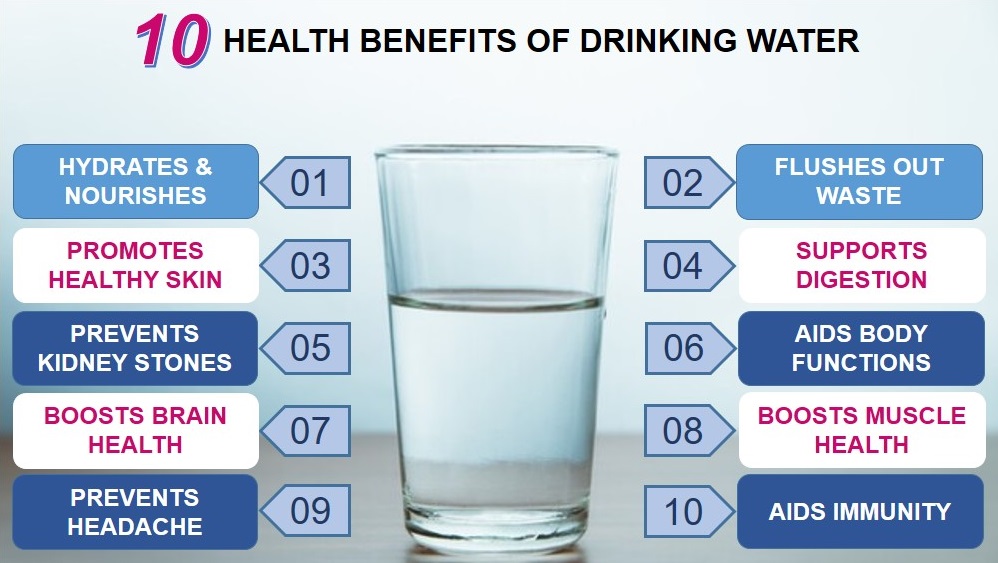
Water is the largest single constituent of the human body and is essential for cellular balance (homeostasis) and life. Total water intake includes drinking water, water in beverages, and water that is part of food.
Getting enough water to drink every day is important for health.
Drinking water can prevent dehydration, a condition that can cause unclear thinking, result in mood change, cause your body to overheat, and lead to constipation and kidney stones.
Water has no calories, so it can also help with managing body weight and reducing calorie intake when substituted for drinks with calories, such as sweet tea or regular soda.
In this article you will learn about:
In the adult human, water makes up approximately 70 to 75 percent of fat-free mass, and fat or adipose tissue is approximately 10 to 40 percent water.
The total body water as a percentage of total body weight at different life stages is represented in Table 1 below.
.jpg)
Body water is distributed between the inside of cells of the body (ICF) and the outside (ECF).
65% of total body water is located in the ICF and 35 percent is in the ECF. The ECF is further divided into the spaces around cells and tissues (interstitial) and blood vessels (plasma spaces).
For example, an average 70-kg man has approximately 42 L of total body water, 28 L of which is in the ICF, and 14 L in the ECF.
The ECF comprises approximately 3 L of plasma and 11 L of interstitial fluid.
These figures of water distribution in the body are not static volumes, but are influenced by continuous and active fluid exchange with varying turnover rates between spaces of the body.
Situations such as exercise, heat exposure, fever, diarrhea, trauma, and skin burns can greatly modify the net volumes and water turnover rates between the different fluid compartments of the body.
With these dynamic levels and distribution of water content in the human body, it is obvious that water must play highly significant roles in maintaining numerous body functions within normal ranges of performance.
These functions include without specific exclusions:
There is no hard and fast recommendation for how much total water intake everyone should have daily, but there are credible recommendations for how much daily total water intake should come from a variety of beverages and foods.
Daily total water intake (fluid) can be defined as the amount of water consumed from foods, plain drinking water, and other beverages.
Daily water intake recommendations vary by age, sex, pregnancy status, and breastfeeding status. One reliable source recommends the following as adequate daily total water intake1:
Fluids (drinking water and beverages) provided 3.0 L and 2.2 L per day for 19- to 30-year-old men and women, respectively, representing approximately 81 percent of total water intake in a U.S. survey. Water contained in food provided the balance of the 19 percent. 1
Note that the figures given above for adequate daily water intake are not to be taken as specific daily requirements as a wide range of intake is compatible with normal hydration.
What are the healthy sources of water?
As shown above, most of our total daily fluid needs are met through the plain water and other beverages we drink. Foods, especially those with high water content, such as many fruits and vegetables are additional sources.
Drinking water is a good way of getting fluids because it has zero calories. The fluid intake of a healthy adult can vary markedly depending on activity level, environmental exposure, diet, and social activities.
Healthy beverage options besides water that are low in calories can be part of a healthy diet and they include:
REFERENCE
Published: October 9, 2022.
© 2022. Datelinehealth Africa Inc. All rights reserved. Permission is herein freely given to use, copy and distribute this resource for non-commercial purposes without alerations and modification, but with attribution as to source.
DATELINEHEALTH AFRICA INC., is a digital publisher for informational and educational purposes and does not offer personal medical care and advice. If you have a medical problem needing routine or emergency attention, call your doctor or local emergency services immediately, or visit the nearest emergency room or the nearest hospital. You should consult your professional healthcare provider before starting any nutrition, diet, exercise, fitness, medical or wellness program mentioned or referenced in the DatelinehealthAfrica website. Click here for more disclaimer notice.